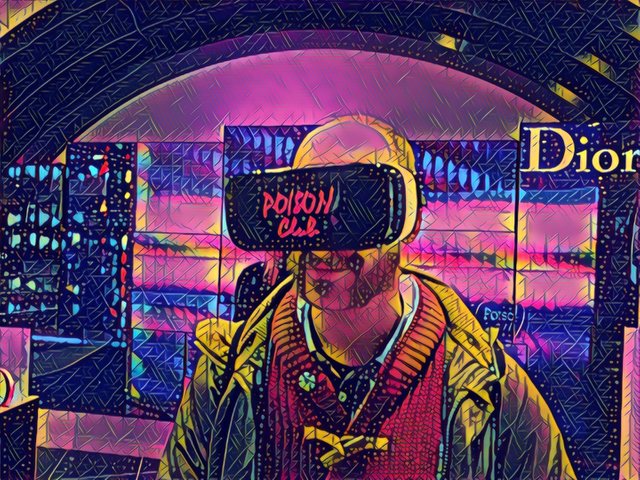Mankind and technology: who owns who?

The below item represents the state of the art in technology, through this tool the lives of men, their daily habits and the whole society changed radically: we are in the Stone Age, 10.000 years ago, and we are talking about this flake tool.

This too, represents the state of the art in technology, through this tool the lives of men, their daily habits and the whole society changed radically: we are in 1992, IBM launches the Simon Personal Communicator, the first smartphone, more than 15 years before Apple released the iPhone.

Rob Stothard/Getty
From the Neolithic age to nowadays, our true nature never changed: we, humans, progress through the ability of modifying and bend the environment around us according to our needs. We, also, are never contented with our achievements and we constantly strive to establish new records. We expand. Call it innate curiosity, resourcefulness, call it greed or even addictive behaviour but, for sure, once we realise that we can have something granting us pleasure (in one of its many shapes), we simply want more and more. We want it all, no matter what.
The aim of this short article is to raise some questions by offering some ideas on the interaction between technology and our brain. Hopefully, these thoughts will stimulate a moment of reflection between us steemians on the direction that mankind is undertaking by embracing the hyperbolic growth of technology without accompanying this progress with a spiritual and ethical one.
What does anthropology teach us?
According to Richard Wrangham, a British anthropologist, for us to survive our brain requires at least one fifth of our daily energy supply, which amounts to the 2% avg. of one person’s body weight (“Catching Fire: How Cooking Made Us Human”, 2009).
Furthermore, Karina Fonseca-Azevedo’s research demonstrates that, in order to satisfy the needs of his evolved brain, the Homo Erectus should have ate raw food at least for nine hours without interruption (“Metabolic Constraint Imposes Tradeoff Between Body Size and Number of Brain Neurons in Human Evolution”, 2012). Differently from primates, moving to a cooked diet allowed the Homo erectus to evolve enhancing his cognitive capabilities.
These and other research shed a light on how all the major human inventions, from the Paleolithic onward, not only have been possible thanks to the peculiar original prerogatives of our brain but, also, contributed in shaping it and making it evolve in its volume and structure as it is now. As a matter of fact, thanks also to his diet and habits, the Homo sapiens brain saw the progressive accentuating of the regions related to depth of planning, communication, problem solving and other more advanced cognitive functions.
Should we conclude for the possibility of our brain to change and being influenced in its anthropological evolution by the same tools that our same brain created?
Taking another perspective: neuroscience and the reward system.
How do we feel when our article is upvoted and maybe even resteemed? What happens in our brain? It will release dopamine, a neurotransmitter whose purpose is to give us a sense of pleasure and, hence, reinforce the repetition of the behaviour connected with such release.
In time, we will look for repeating that behaviour that provided us with a pleasuring feeling, this is called the “reward system”. This system is an apparatus of neural structures within the brain responsible for incentive salience (motivation and "wanting", desire, craving for a reward), associative learning (primarily positive reinforcement and classical conditioning), and positive emotions, particularly ones which involve pleasure as a core component (e.g., joy, euphoria and ecstasy).
If, on one hand, it is true that this mechanism is essential for the survival of one’s self and offspring, we should also acknowledge that, on the other hand, a behaviour that is both rewarding and reinforcing goes to be classified as an addiction.
“In plain English, if we repeatedly obtain some pleasurable experience we start to want it more. It moves up the rankings of experiences we would like to repeat. If we regularly engage in an extremely pleasurable experience, it is only natural that we will come to place a higher importance on that experience. The Liberal View is not so minimal that it cannot say what addictions are. They are strong appetites toward pleasure” (The minimal Liberal view of addiction expounded by Foddy and Savulescu, 2010).
Society nowadays: what is happening to us?
Are we capable to handle the steep curve of the progress in technologies of this contemporary age?
Are we aware of the risks intrinsic to an indiscriminate/uneducated use of technology in our daily life? (I don’t need to mention how people, for the sake of entertaining with an app, often give their most private data to unknown companies without even realising it).
The era in which we live has been defined as a period of “liquid modernity”, in which our devices, our tech gadgets will slowly but progressively integrate with us, always closer to our bodies and brains. We become spectators of our optimised and enhanced life, through the story we narrate through the social networks, an extension and, at the same time, a simulacrum of ourselves. “Nomadism becomes a general trait of the 'liquid modern' man as he flows through his own life like a tourist, changing places, jobs, spouses, values and sometimes more—such as political or sexual orientation—excluding himself from traditional networks of support, while also freeing himself from the restrictions or requirements those networks impose” (Zygmunt Bauman, Liquid Modernity, 2000).
As I mentioned before, this article aims to raise questions and not to give answers, which I could never give after all. When we look at the unconscious mechanisms of our mind, it is possible that integrating the insights on our nature given by anthropology, neuroscience, cognitive behavioural science and sociology will allow us to gain a new level of awareness; particularly on the risks of progressing without “educating” us to this rapidly changing environment.
In conclusion, it is possible that not only our society but even our brain in the long run will be modified by the use of technology. Whether this is the case or not, whether it will happen due to external enhancing or to an internal invisible process, I believe that a deep and urgent discussion would be appropriate. As technology progresses, the same should be for mankind's awareness and conscience.
If you enjoyed this article, please remember the three magic words: upvote, resteem and follow! You will help me to grow and keep writing with enthusiasm (plus, I'm very much eager to return the favour and build good friendships here). Thanks!
Upvoted. Scary in my opinion. Tech giants are a bit out of control.
I just wrote about it if interested:
https://steemit.com/technology/@vlemon/morality-in-silicon-valley
Thank you vlemon! Tech giant are becoming more powerful than entire countries.. if we connect the dots I am not really sure that i'm liking the picture that comes out. Upvoted you, resteemed your article and followed ;-)
I am sure that it is dangerous! Following you from now on.
I hope to talk to you again on this topic or another ;):
Sure! I like to exchange opinions on each other's articles..I am going to post one in some minutes, not really conventional :-P Good luck with your writing!
Aren't the two inextricably linked? Can we really look at it through the lenses of who owns who and just say that we have never and can never do without these things?
Yes @nicholas83, I agree in not assuming a dogmatic position, which is not the purpose of the article after all. However, I would point to the necessity of raising the level of awareness related to the consequences of extensive use of certain technology. If we accept it as a good trade-off, be it (or maybe for someone there will be just vantages). The point is that before accepting something you need to first aknowledge it and I think that we still have a bit of work to do from this perspective. Thanks for your comment!
Technology has been developing at an increasing rate and transforming industries. Elon Musk is trying to put stuff in our brains I think.
Apparently @pjcswart the IOTA (the cryptocurrency) will enable machines to pay each other..talking about industries transforming!
Sounds like fun how does that work?
Sounds like profit to me ..i invested a small amount hoping for a good risk/reward ratio. Look here: http://boxmining.com/what-is-iota-in-a-nutshell/
Good point. I hope you have a WONDERFUL day!! 😀 😃 😄 😁 😆
Have a gorgeous weekend too..and good luck with your articles ;-)
I feel technology is going to make people become more soft and weak.
Most people won`t even speak to their own next door neighbours. Yet they will interact, become more open than ever before and put more trust into a complete stranger they have never met before through the internet.
The internet is just one big bubble and one day it will eventually burst!
I understand your point @makkizakki, but..how come everyone feel concerned like you, but notwithstanding this, everyone stay almost all the day attached to their devices. A recent statistic shows that Americans stay almost 3 hours per day looking at the smartphone.
I never believe in stats, just all pointless numbers, with no sense of direction towards life.
I am not concerned by this as I have discipline. I live easy, I live light, like a ghost in the night.
People like to own attachments but sooner than later the attachments start owning you like emotions, internet, mobile phones, the list goes on and on...
Does it really matter that your the best or worse at something?
In the end we all crumble like a old wall.
When people look at messages on here, emails or even mobile phone texts do you think they are actually reading them with full concentration or just scanning them like you would do with food in a supermarket?
The more a person scans these messages the more their memory span is going to shrink and shorten their concentration levels too.
Your post is interesting and thanks for sharing it too!
You made a good point on the concentration..even discussions with friends changed, our awareness levels changed and lowered, there would be a lot to say about this worrisome trend in society.
Thanks for contributing with your comment, followed you.
Thanks for the discussion as well and I`m also following you back too.
@OriginalWorks
The @OriginalWorks bot has determined this post by @f3nix to be original material and upvoted it!
To call @OriginalWorks, simply reply to any post with @originalworks or !originalworks in your message!
To nominate this post for the daily RESTEEM contest, upvote this comment! The user with the most upvotes on their @OriginalWorks comment will win!
For more information, Click Here!
Very deep and observant. It seems like technology is making people lazier in the brain, or at least i am because i will cite anything i can with a simple copy & paste in lieu of paraphrasing information.
I do have a solid opinion on soul and mental growth and the net because the availability of groups and data. I mean that i was able to join on line covens and learn so much about the Occult from the safety of my own home ;) There are doors thrown wide open for those who use it for positive or it can close doors for those use it negatively. Excellent tool it is. Thought provoking stuff.
To be cautious about the seeming exponential rise in technological innovation is prudent, as there are a multitude of scenarios that cannot be expected such as unknown unknowns. For what I can foresee the results do not look to be positive.
An interesting post!
Thank you so much @outtayourbox! I honestly try to be prudent and not to be judgemental or run to conclusions, but I share your concern.. unless we start really to try and understand what the hell we are doing to ourselves with the many "toys" surrounding us and how we are changing.
I don't know if you read about Stephen Hawking and Elon Musk on the future of artificial intelligence..
I have read what both have said about AI, the problem is that we don't have many models to predict the steps between a rudimentary AI and more intelligent->super intelligent AI, and the time taken to get there.
I think in around two years there will be a much clearer understanding of how much progress has been made
I just hope that this clearer understanding won't happen once the singularity have already outpaced us all (there are some interesting posts on reddit on this)
Self learning is a huge step I believe.
Congratulations @f3nix!
Your post was mentioned in the hit parade in the following category:
Thank you @arcange !.. it's for sure a big encouragement to keep trying to create something worth to be read. I see great future and potential for this network :-)
Compliments for writing an article with many insights and links to interesting research..I appreciate your effort to get a holistic point of view taking from various disciplines. Keep up the good work! :-)
Congratulations @f3nix! You have completed some achievement on Steemit and have been rewarded with new badge(s) :
Click on any badge to view your own Board of Honor on SteemitBoard.
For more information about SteemitBoard, click here
If you no longer want to receive notifications, reply to this comment with the word
STOP@f3nix thank you for visiting in my place!
Let me follow you.....
Followed you back @ridwant..good luck with your posting! ;-)